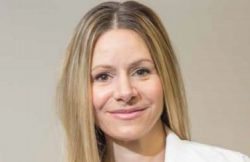Nicole Lapinel, M.D.
Legacy of Care
 As a 5-year-old, Pulmonologist Nicole Lapinel, M.D., already knew she wanted to be a doctor. While her father studied for medical school, she pored over his books and played with his anatomy skeleton.
As a 5-year-old, Pulmonologist Nicole Lapinel, M.D., already knew she wanted to be a doctor. While her father studied for medical school, she pored over his books and played with his anatomy skeleton.
Amazingly, at age 7, she already showed a knack for pulmonology. Near the end of a shift, Dr. Lapinel’s father dressed her and her sister in scrubs and took them to the ICU on-call room. He placed an x-ray on the light box and asked her what she saw.
“I kid you not, I was able to identify a pneumothorax,” she says. “I told him, ‘The heart is getting pushed over to the wrong side; the lungs don’t look right there.’”
Following in the footsteps of her grandfather, father and four uncles who are all physicians, the family legacy is alive and well — Dr. Lapinel wrapped up her LSU fellowship in pulmonary critical care and was hired to remain in the department.
In the past few years, while specializing in mycobacterial diseases, she forged a mentorship under Dr. Juzar Ali who runs the Wetmore Tuberculosis Clinic, and with Dr. David Welsh who, among other interests, works with HIV/AIDS patients. Dr. Welsh has long been interested in the burden of pulmonary infections that gravely effect his patients’ compromised immune systems. Meanwhile, Dr. Ali created a specialty track for her aimed at researching nontuberculous mycobacterial pulmonary infections in a wide-range of patients in the region.
NTM — with more than 150 different strains — isn’t contagious like TB. NTM infections are picked up through water and soil, and can cause serious respiratory problems in relatively healthy individuals. What motivates physicians to press for better treatment and prevention is that the current burdensome antibiotic regimen can take from 12 to 24 months with challenging side effects and danger of the NTM becoming drug-resistant.
Dr. Lapinel initiated a database to track NTM infection and disease to better understand the types of patients affected and why. She looks at environmental exposures, medical history, medications taken, variety of presenting symptoms and how they relate to specific strains of the disease. She is also starting a biobank of blood and sputum samples to conduct research under the microscope for more specific conclusions. Among other theories, the heat, moisture and bacterial growth of the local swampy environment are believed to contribute to the prevalence of NTM.
“There’s not a great deal of research in this area,” she says. “Tuberculosis is more of a focus because of the public health concern. But here in Southeast Louisiana, there is a quite a burden of these NTM. It’s not as virulent and not as infective, but still, little is understood about the long-term impact and outcomes of these diseases.”
Drs. Lapinel and Ali are pushing for success in the hopes of securing national funding for technology, treatment and prevention of NTM, much the way TB is funded today. “We hope to grow it into what will become a comprehensive referral center for NTM treatment and research,” she says.
A day in the life: Dr. Lapinel is responsible for much more than just NTM research at LSU. She and Dr. Ali extend their clinical services to the University Medical Center Environmental Lung Disease Clinic and the critical care unit. She works at the LSU St. Charles Clinic, and, of course, LSU being an academic institution, she is also an assistant professor. This is all while balancing life with a newborn baby and her husband’s LSU Nephrology fellowship.
“It definitely takes some creativity and getting by on few hours of sleep,” she says. “Luckily, I’m used to that.”
The LSU advantage: Every Thursday afternoon, more than 90 percent of the LSU pulmonary/critical care faculty gather to present interesting cases, pose academic questions, and deepen learning with residents and fellows. “I like to believe, based on what I’ve seen so far, it’s one of the most robust conferences of any program in the city,” she says. “It’s a group that truly loves what they do. They love sitting down elbow to elbow, working side by side in an effort to improve on what they already know.”
The strength of academic medicine: “I didn’t even consider private practice,” Dr. Lapinel says. “I love academics and I love teaching. When you work in this environment, you strengthen your skills and knowledge as a physician. It’s incumbent on you to remain fresh and on the leading-edge of new information.”
A New Yorker in the Crescent City: Living here has been a great experience for Dr. Lapinel and her husband. They both adore the weather and taking daily walks through City Park with their baby and dog. Plus: “My husband and I are in love with all forms of music; I appreciate the fact that it is so celebrated here. I also love that I can get to work in 15 minutes. In New York, I lived two miles away and it would take me an hour!”
Internship: St. Vincent’s Hospital, NY, Internal Medicine
Residency: Lenox Hill Hospital North Shore LIJ Northwell System, Internal Medicine, Chief Resident
Fellowship: LSU, Pulmonary/Critical Care
LSU Pulmonary/Critical Care
3700 St. Charles Ave.,, 2nd Floor
New Orleans, LA 70115
(504) 412-1366
